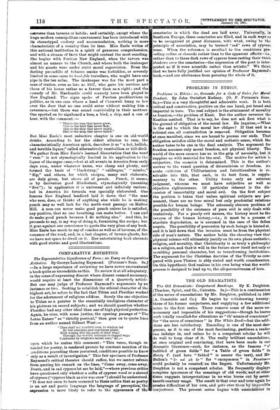PROBLEMS IN ETHICS.
Problems in Ethics ; or, Grounds for a Code of Rules for Mora Conduct. By John Steinfort Kedney. (G. P. Putnam's Sons. Gs.)—This is a very thoughtful and admirable work. It is both critical and constructive, positive on the one hand, yet broad and impartial in tone. The real subject is the attainment of morality as freedom,—the problem of Kant. But the author reverses the Eantian method. That is to say, he does not ask first what is the ground of obligation of the moral law. He inquires,—What is the end to which the moral law obliges ? If that end is a rational one, all contradiction is removed. Obligation becomes at once manifest, since we are bound to pursue our ends. That obligation satisfies alike the moral and teethetic sense, which the author takes to be one in the final analysis. The argument for freedom assumes only moral freedom, not physical liberty. The world of the mere cosmos has us in the grip of necessity, but it supplies us with material for the soul. The motive for action is subjective, the occasion is determined. This is the author's answer to the vexed question of determinism or freedom. An acute criticism of Utilitarianism and Intuitionalism is re- solvable into this, that each, in its best form, is supple- mentary to the other. Utility forms only an external judgment, whereas we must have subjective as well as objective righteousness. Of particular interest is the dis- cussion of immortality and moral evil. On the first subject the position is taken that unless spiritual subjects are per- manent, there are no true moral but only prudential relations possible for human beings. The extremely obscure problem of the possibility of the existence of pure evil is only dealt with tentatively. For a purely evil nature, the history must be the reverse of the human history,—i.e., it must be a process of absolute degradation, as is assumed in the case of the fallen angels. The possibility of possession by such beings is hinted at, and it is laid down that the invasion must be from the physical side of man's nature. The author holds the cheering view that physical science will ultimately justify on its own plane msthetics, religion, and morality, that Christianity is as truly a philosophy as a religion, and that it will in the future show itself not only as moulding personal character, but as transforming institutions. The argument for the Christian doctrine of the Trinity as com- pared with pure Theism is ably stated and worth consideration. On this hypothesis God realises in his own being what the world- process is designed to lead up to, the all-pervasiveness of love.


















































 Previous page
Previous page